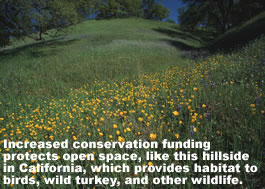
 |
| Home > Policy Issues > Conservation Funding > Introduction | |||
IntroductionProtected lands are an important way of preserving a state’s biodiversity and ecological integrity. Everyone benefits from the improved air, soil, and water quality; expanded opportunities for outdoor recreation; improved wildlife habitats; and, pristine waterways these areas provide. Many state and local governments, nonprofit organizations, and others are in the process of strategically identifying those natural areas that would provide the most ecological benefit if placed under some level of protection – common conservation mechanisms include outright acquisition, conservation easements, retained life estates, and rights-of-first-refusal. While these groups have the scientific expertise to make such decisions, they often lack the financial resources to make formal protection of unique lands a reality. |
|||
|
|||
Dedication to funding demonstrates a state’s commitment to preserving its natural areas, while also acknowledging the key role that local governments, private landowners, and nonprofit organizations play in conservation. Unfortunately, the budget shortfalls many states are currently facing may jeopardize current conservation funding levels. This web site offers the tools necessary for you to introduce and pass strong conservation funding legislation in your state, including talking points, press clips, a fact pack, research, and other background information. We may have other useful materials on this subject, which are not posted on our web site. Please feel free to contact us at info@serconline.org or call our office in Madison, Wisconsin, at (608) 252-9800. If you’ve used this site and found it helpful or, if you have suggestions about how it could be made more helpful, please let us know. Feel free to use the sample bill text included here in your state. If you do, please notify us. |
|||
| This package was last updated on September 2, 2004. |
